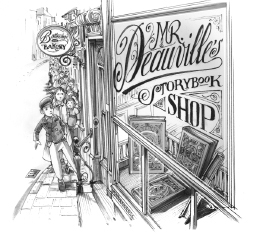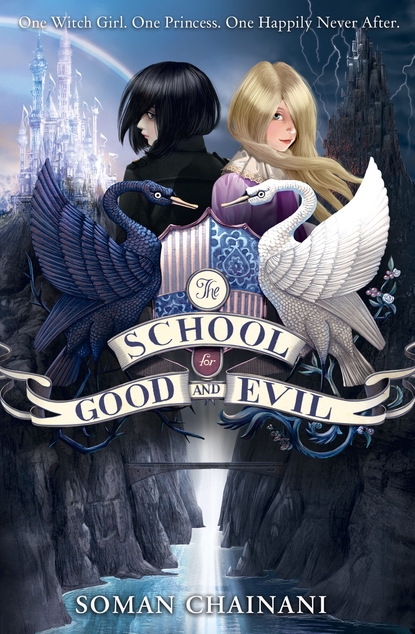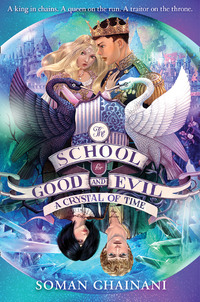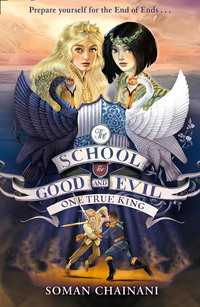
Полная версия
The School for Good and Evil: The Complete 6-book Collection
“Graveyards have their benefits,” Agatha said. “No nosy neighbors. No drop-in salesmen. No fishy ‘friends’ bearing face masks and diet cookies, telling you you’re going to Evil School in Magic Fairy Land.” She flicked a match with relish.
Sophie put down her cucumber. “So I’m fishy now.”
“Who asked you to show up? I was perfectly fine alone.”
“You always let me in.”
“Because you always seem so lonely,” said Agatha. “And I feel sorry for you.”
“Sorry for me?” Sophie’s eyes flashed. “You’re lucky that someone would come see you when no one else will. You’re lucky that someone like me would be your friend. You’re lucky that someone like me is such a good person.”
“I knew it!” Agatha flared. “I’m your Good Deed! Just a pawn in your stupid fantasy!”
Sophie didn’t say anything for a long time.
“Maybe I became your friend to impress the School Master,” she confessed finally. “But there’s more to it now.”
“Because I found you out,” Agatha grumbled.
“Because I like you.”
Agatha turned to her.
“No one understands me here,” Sophie said, looking at her hands. “But you do. You see who I am. That’s why I kept coming back. You’re not my good deed anymore, Agatha.”
Sophie gazed up at her. “You’re my friend.”
Agatha’s neck flushed red.
“What’s wrong?” Sophie frowned.
Agatha hunched into her dress. “It’s just, um . . . I—I’m, uh . . . not used to friends.”
Sophie smiled and took her hand. “Well, now we’ll be friends at our new school.”
Agatha groaned and pulled away. “Say I sink to your intelligence level and pretend to believe all this. Why am I going to villain school? Why has everyone elected me the Mistress of Evil?”
“No one says you’re evil, Agatha,” Sophie sighed. “You’re just different.”
Agatha narrowed her eyes. “Different how?”
“Well, for starters, you only wear black.”
“Because it doesn’t get dirty.”
“You don’t ever leave your house.”
“People don’t look at me there.”
“For the Create-a-Tale Competition, your story ended with Snow White eaten by vultures and Cinderella drowning herself in a tub.”
“I thought it was a better ending.”
“You gave me a dead frog for my birthday!”
“To remind you we all die and end up rotting underground eaten by maggots so we should enjoy our birthdays while we have them. I found it thoughtful.”
“Agatha, you dressed as a bride for Halloween.”
“Weddings are scary.”
Sophie gaped at her.
“Fine. So I’m a little different,” Agatha glared. “So what?”
Sophie hesitated. “Well, it’s just that in fairy tales, different usually turns out, um . . . evil.”
“You’re saying I’m going to turn out a Grand Witch,” said Agatha, hurt.
“I’m saying whatever happens, you’ll have a choice,” Sophie said gently. “Both of us will choose how our fairy tale ends.”
Agatha said nothing for a while. Then she touched Sophie’s hand. “Why is it you want to leave here so badly? That you’d believe in stories you know aren’t true?”
Sophie met Agatha’s big, sincere eyes. For the first time, she let in the tides of doubt.
“Because I can’t live here,” Sophie said, voice catching. “I can’t live an ordinary life.”
“Funny,” said Agatha. “That’s why I like you.”
Sophie smiled. “Because you can’t either?”
“Because you make me feel ordinary,” Agatha said. “And that’s the only thing I’ve ever wanted.”
The tenor-tolled clock sang darkly in the valley, six or seven, for they had lost track of time. And as the echoes faded into the buzz of the distant square, both Sophie and Agatha made a wish. That one day from now, they’d still be in the company of the other.
Wherever that was.


But while shivering children tightened their window screws, Sophie prepared to undo hers. She wanted this kidnapping to be as convenient as possible. Barricaded in her room, she laid out hairpins, tweezers, nail files and went to work.

The first kidnappings happened two hundred years before. Some years it was two boys taken, some years two girls, sometimes one of each. The ages were just as fickle; one could be sixteen, the other fourteen, or both just turned twelve. But if at first the choices seemed random, soon the pattern became clear. One was always beautiful and good, the child every parent wanted as their own. The other was homely and odd, an outcast from birth. An opposing pair, plucked from youth and spirited away.
Naturally the villagers blamed bears. No one had ever seen a bear in Gavaldon, but this made them more determined to find one. Four years later, when two more children vanished, the villagers admitted they should have been more specific and declared black bears the culprit, bears so black they blended with the night. But when children continued to disappear every four years, the village shifted their attention to burrowing bears, then phantom bears, then bears in disguise . . . until it became clear it wasn’t bears at all.
But while frantic villagers spawned new theories (the Sinkhole Theory, the Flying Cannibal Theory) the children of Gavaldon began to notice something suspicious. As they studied the dozens of Missing posters tacked up in the square, the faces of these lost boys and girls looked oddly familiar. That’s when they opened up their storybooks and found the kidnapped children.
Jack, taken a hundred years before, hadn’t aged a bit. Here he was, painted with the same moppy hair, pinked dimples, and crooked smile that had made him so popular with the girls of Gavaldon. Only now he had a beanstalk in his back garden and a weakness for magic beans. Meanwhile, Angus, the pointy-eared, freckled hooligan who had vanished with Jack that same year, had transformed into a pointy-eared, freckled giant at the top of Jack’s beanstalk. The two boys had found their way into a fairy tale. But when the children presented the Storybook Theory, the adults responded as adults most often do. They patted the children’s heads and returned to sinkholes and cannibals.
But then the children showed them more familiar faces. Taken fifty years before, sweet Anya now sat on moonlit rocks in a painting as the Little Mermaid, while cruel Estra had become the devious sea witch. Philip, the priest’s upright son, had grown into the Cunning Little Tailor, while pompous Gula spooked children as the Witch of the Wood. Scores of children, kidnapped in pairs, had found new lives in a storybook world. One as Good. One as Evil.
The books came from Mr. Deauville’s Storybook Shop, a musty nook between Battersby’s Bakery and the Pickled Pig Pub. The problem, of course, was where old Mr. Deauville got his storybooks.
Once a year, on a morning he could not predict, he would arrive at his shop to find a box of books waiting inside. Four brand-new fairy tales, one copy of each. Mr. Deauville would hang a sign on his shop door: “Closed Until Further Notice.” Then he’d huddle in his back room day after day, diligently copying the new tales by hand until he had enough books for every child in Gavaldon. As for the mysterious originals, they’d appear one morning in his shop window, a sign that Mr. Deauville had finished his exhausting task at last. He’d open his doors to a three-mile line that snaked through the square, down hillslopes, around the lake, jammed with children thirsting for new stories, and parents desperate to see if any of the missing had made it into this year’s tales.
Needless to say, the Council of Elders had plenty of questions for Mr. Deauville. When asked who sent the books, Mr. Deauville said he hadn’t the faintest idea. When asked how long the books had been appearing, Mr. Deauville said he couldn’t remember a time when the books did not appear. When asked whether he’d ever questioned this magical appearance of books, Mr. Deauville replied: “Where else would storybooks come from?”
Then the Elders noticed something else about Mr. Deauville’s storybooks. All the villages in them looked just like Gavaldon. The same lakeshore cottages and colorful eaves. The same purple and green tulips along thin dirt roads. The same crimson carriages, wood-front shops, yellow schoolhouse, and leaning clock tower, only drawn as fantasy in a land far, far away. These storybook villages existed for only one purpose: to begin a fairy tale and to end it. Everything between the beginning and end happened in the dark, endless woods that surrounded the town.
That’s when they noticed that Gavaldon too was surrounded by dark, endless woods.
Back when the children first started to disappear, villagers stormed the forest to find them, only to be repelled by storms, floods, cyclones, and falling trees. When they finally braved their way through, they found a town hiding beyond the trees and vengefully besieged it, only to discover it was their own. Indeed, no matter where the villagers entered the woods, they came out right where they started. The woods, it seemed, had no intention of returning their children. And one day they found out why.
Mr. Deauville had finished unpacking that year’s storybooks when he noticed a large smudge hiding in the box’s fold. He touched his finger to it and discovered the smudge was wet with ink. Looking closer, he saw it was a seal with an elaborate crest of a black swan and a white swan. On the crest were three letters:
S.G.E.
There was no need for him to guess what these letters meant. It said so in the banner beneath the crest. Small black words that told the village where its children had gone:
THE SCHOOL FOR GOOD AND EVIL
The kidnappings continued, but now the thief had a name.
They called him the School Master.
A few minutes after ten, Sophie pried the last lock off the window and cracked open the shutters. She could see to the forest edge, where her father, Stefan, stood with the rest of the perimeter guard. But instead of looking anxious like the others, he was smiling, hand on the widow Honora’s shoulder. Sophie grimaced. What her father saw in that woman, she had no idea. Once upon a time, her mother had been as flawless as a storybook queen. Honora, meanwhile, had a small head, round body, and looked like a turkey.
Her father whispered mischievously into the widow’s ear and Sophie’s cheeks burned. If it were Honora’s two little sons who might be taken, he’d be serious as death. True, Stefan had locked her in at sundown, given her a kiss, dutifully acted the loving father. But Sophie knew the truth. She had seen it in his face every day of her life. Her father didn’t love her. Because she wasn’t a boy. Because she didn’t remind him of himself.
Now he wanted to marry that beast. Five years after her mother’s death, it wouldn’t be seen as improper or callous. A simple exchange of vows and he’d have two sons, a new family, a fresh start. But he needed his daughter’s blessing first for the Elders to allow it. The few times he tried, Sophie changed the subject or loudly chopped cucumbers or smiled the way she did at Radley. Her father hadn’t mentioned Honora again.
Let the coward marry her when I’m gone, she thought, glaring at him through the shutters. Only when she was gone would he appreciate her. Only when she was gone would he know no one could replace her. And only when she was gone would he see he had spawned much more than a son.
He had borne a princess.
On her windowsill, Sophie laid out gingerbread hearts for the School Master with delicate care. For the first time in her life, she’d made them with sugar and butter. These were special, after all. A message to say she’d come willingly.
Sinking into her pillow, she closed her eyes on widows, fathers, and wretched Gavaldon and with a smile counted the seconds to midnight.
As soon as Sophie’s head vanished beneath the window, Agatha shoved the gingerbread hearts in her mouth. Only thing these will invite are rats, she thought, crumbs dribbling on her black clump shoes. She yawned and set on her way as the town clock inched past the quarter hour.
Upon leaving Sophie after their walk, Agatha had started home only to have visions of Sophie darting into the woods to find this School for Fools and Crackpots and ending up gored by a boar. So she returned to Sophie’s garden and waited behind a tree, listening as Sophie undid her window (singing a birdbrained song about princes), packed her bags (now singing about wedding bells), put on makeup and her finest dress (“Everybody Loves a Princess in Pink”?!), and finally (finally!) tucked herself into bed. Agatha mashed the last crumbs with her clump and trudged towards the cemetery. Sophie was safe and would wake up tomorrow feeling like a fool. Agatha wouldn’t rub it in. Sophie would need her even more now and she would be there for her. Here in this safe, secluded world, the two of them would make their own paradise.
As Agatha tramped up the slope, she noticed an arc of darkness in the forest’s torch-lit border. Apparently the guards responsible for the cemetery had decided what lived inside wasn’t worth protecting. For as long as Agatha could remember, she’d had a talent for making people go away. Kids fled from her like a vampire bat. Adults clung to walls as she passed, afraid she might curse them. Even the grave keepers on the hill bolted at the sight of her. With each new year, the whispers in town grew louder—“witch,” “villain,” “Evil School”—until she looked for excuses not to go out. First days, then weeks, until she haunted her graveyard house like a ghost.
There were plenty of ways to entertain herself at first. She wrote poems (“It’s a Miserable Life” and “Heaven Is a Cemetery” were her best), drew portraits of Reaper that frightened mice more than the real cat did, and even tried her hand at a book of fairy tales, Grimly Ever After, about beautiful children who die horrible deaths. But she had no one to show these things to until the day Sophie knocked.
Reaper licked her ankles as she stepped onto her squeaking porch. She heard singing inside—
“In the forest primeval
A School for Good and Evil . . .”
Agatha rolled her eyes and pushed open the door.
Her mother, back turned, sang cheerily as she packed a trunk with black capes, broomsticks, and pointy black witch’s hats.
“Two towers like twin heads
One for the pure,
One for the wicked.
Try to escape you’ll always fail
The only way out is
Through a fairy tale . . .”
“Planning an exotic vacation?” Agatha said. “Last time I checked, there’s no way out of Gavaldon unless you grow wings.”
Callis turned. “Do you think three capes is enough?” she asked, bug eyes bulging, hair a greasy black helmet.
Agatha winced at just how much they looked alike. “They’re exactly the same,” she muttered. “Why do you need three?”
“In case you need to lend one to a friend, dear.”
“These are for me?”
“I put two hats in case one gets squashed, a broomstick in case theirs smells, and a few vials of dog tongues, lizard legs, and frog toes. Who knows how long theirs have been sitting there!”
Agatha knew the answer but asked anyway. “Mother, what do I need capes, hats, and frog toes for?”
“For New Witch Welcoming, of course!” Callis trilled. “You don’t want to get to the School for Evil and look like an amateur.”
Agatha kicked off her clumps. “Let’s put aside the fact the town doctor believes all this. Why is it so hard to accept I’m happy here? I have everything I need. My bed, my cat, and my friend.”
“Well, you should learn from your friend, dear. At least she wants something from life,” Callis said, latching the trunk. “Really, Agatha, what could be a greater destiny than a Fairy Tale Witch? I dreamed of going to the School for Evil! Instead, the School Master took that idiot Sven, who ended up outwitted by a princess in The Useless Ogre and set on fire. I’m not surprised. That boy could barely lace his own boots. I’m sure if the School Master could have done it over, he’d have taken me.”
Agatha slid under her covers. “Well, everyone in this town still thinks you’re a witch, so you got your wish after all.”
Callis whipped around. “My wish is that you get away from here,” she hissed, eyes dark as coal. “This place has made you weak and lazy and afraid. At least I made something of myself here. You just waste and rot until Sophie comes to walk you like a dog.”
Agatha stared at her, stunned.
Callis smiled brightly and resumed packing. “But do take care of your friend, dear. The School for Good might seem like a festoon of roses, but she’s in for a surprise. Now go to bed. The School Master will be here soon and it’s easier for him if you’re asleep.”
Agatha pulled the sheets over her head.
Sophie couldn’t sleep. Five minutes to midnight and no sign of an intruder. She knelt on her bed and peered through the shutters. Around Gavaldon’s edge, the thousand-person guard waved torches to light up the forest. Sophie scowled. How could he get past them?
That’s when she noticed the hearts on her windowsill were gone.
He’s already here!
Three packed pink bags plopped through the window, followed by two glass-slippered feet.
Agatha lurched up in bed, jolted from a nightmare. Callis snored loudly across the room, Reaper at her side. Next to Agatha’s bed sat her locked trunk, marked “Agatha of Gavaldon, 1 Graves Hill Road” in scraggy writing, along with a pouch of honey cakes for the journey.
Chomping cake, Agatha gazed through a cracked window. Down the hill, the torches blazed in a tight circle, but here on Graves Hill, there was just one burly guard left, arms as big as Agatha’s whole body, legs like chicken drumsticks. He kept himself awake by lifting a broken headstone like a barbell.
Agatha bit into the last honey cake and looked out at the dark forest.
Shiny blue eyes looked back at her.
Agatha choked and dove to her bed. She slowly lifted her head. Nothing there. Including the guard.
Then she found him, unconscious over the broken headstone, torch extinguished.
Creeping away from him was a bony, hunchbacked human shadow. No body attached.
The shadow floated across the sea of graves without the slightest sign of hurry. It slid under the cemetery gates and skulked down the hill towards the firelit center of Gavaldon.
Agatha felt horror strangle her heart. He was real. Whoever he was.
And he doesn’t want me.
Relief crashed over her, followed by a fresh wave of panic.
Sophie.
She should wake her mother, she should cry for help, she should— No time.
Feigning sleep, Callis heard Agatha’s urgent footsteps, then the door close. She hugged Reaper tighter to make sure he didn’t wake up.
Sophie crouched behind a tree, waiting for the School Master to snatch her.
She waited. And waited. Then she noticed something in the ground.
Cookie crumbs, mashed into a footprint. The footprint of a clump so odious, so foul it could only belong to one person. Sophie’s fists curled, her blood boiled—
Hands covered her mouth and a foot booted her through her window. Sophie crashed headfirst onto her bed and whirled around to see Agatha. “You pathetic, interfering worm!” she screamed, before glimpsing the fear in her friend’s face. “You saw him!” Sophie gasped—
Agatha put one hand over Sophie’s mouth and pinned her to the mattress with the other. As Sophie writhed in protest, Agatha peeped through the window. The crooked shadow drifted into the Gavaldon square, past the oblivious armed guard, and headed directly for Sophie’s house. Agatha swallowed a scream. Sophie wrenched free and grabbed her shoulders.
“Is he handsome? Like a prince? Or a proper schoolmaster with spectacles and waistcoat and—”
THUMP!
Sophie and Agatha slowly turned to the door.
THUMP! THUMP!
Sophie wrinkled her nose. “He could just knock, couldn’t he?”
Locks cracked. Hinges rattled.
Agatha shrank against the wall, while Sophie folded her hands and fluffed her dress as if expecting a royal visit. “Best give him what he wants without fuss.”
As the door caved, Agatha leapt off the bed and threw herself against it. Sophie rolled her eyes. “Oh, sit down for goodness’ sake.” Agatha pulled at the knob with all her might, lost her grip—the door slammed open with a deafening crack, hurling her across the room.
It was Sophie’s father, white as a sheet. “I saw something!” he panted, waving his torch.
Then Agatha caught the crooked shadow on the wall stepping into his broad silhouette. “There!” she cried. Stefan swiveled but the shadow blew out his torch. Agatha grabbed a match from her pocket and lit it. Stefan lay on the ground unconscious. Sophie was gone.
Screams outside.
Through the window, Agatha watched shouting villagers chase after Sophie as the shadow dragged her towards the woods. And while more and more villagers howled and chased—
Sophie smiled ear to ear.
Agatha lunged through the window and ran after her. But just as the villagers reached Sophie, their torches magically exploded and trapped them in rings of fire. Agatha dodged the gauntlet of firetraps and dashed to save her friend before the shadow pulled her into the forest.
Sophie felt her body leave soft grass and rake against stony dirt. She frowned at the thought of showing up to school in a soiled dress. “I really thought there’d be footmen,” she said to the shadow. “Or a pumpkin carriage, at least.”
Agatha ran ferociously, but Sophie had almost disappeared into the trees. All around, flames spewed higher and higher, poised to devour the entire village.
Seeing the fires leap, Sophie felt relief knowing no one could rescue her now. But where is the second child? Where is the one for Evil? She’d been wrong about Agatha all along. As she felt herself pulled into trees, Sophie looked back at the towering blaze and kissed goodbye to the curse of ordinary life.
“Farewell, Gavaldon! Farewell, low ambition! Farewell, mediocrity—”
Then she saw Agatha charge through the flames.
“Agatha, no!” Sophie cried—
Agatha leapt on top of her and both were dragged into the darkness.
Instantly, the fires around the villagers were extinguished. They dashed for the woods, but the trees magically grew thick and thorny, locking them out.
It was too late.
“WHAT ARE YOU DOING!” roared Sophie, shoving and scratching Agatha as the shadow pulled them into pitch-black forest. Agatha thrashed wildly, trying to wrest the shadow’s grip on Sophie and Sophie’s grip on the shadow. “YOU’RE RUINING EVERYTHING!” Sophie howled. Agatha bit her hand. “EEEEEYIIII!!!!” Sophie brayed and flipped her body so Agatha scraped against dirt. Agatha flipped Sophie back and climbed towards the shadow, her clump squashing Sophie’s face.
“WHEN MY HANDS FIND YOUR NECK—”
They felt themselves leave the ground.
As something spindly and cold wrapped its way around them, Agatha fumbled for a match from her dress, struck it against her bony wrist, and paled. The shadow was gone. They were cocooned in the creepers of an elm, which ferried them up the enormous tree and plopped them on the lowest branch. Both girls glared at each other and tried to catch enough breath to speak. Agatha managed it first.









